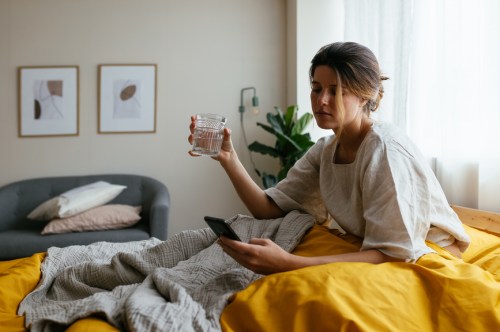Waking Up To Pee in the Middle of the Night Way Too Often? You May Need More of This Nutrient
Here, a doctor and pelvic floor therapist share why constipation can cause you to pee at night and why we should eat more fiber for nocturia.

Being forced to peel yourself away from the warm comfort of your bed is never a particularly welcome occasion, but it’s certainly made even less ideal when it happens in the middle of the night—and over and over again. Sure, many of us have the urge to go to the bathroom at some point while we’re sleeping, but if this disruption is becoming more frequent than normal, you may be dealing with a condition known as nocturia.
Experts in This Article
co-founder of bistroMD
doctor of physical therapy, owner of Femina Physical Therapy, and author of Sex Without Pain
“Nocturia is a condition that causes someone to wake up during the night to urinate,” explains functional medicine doctor Caroline Cederquist, MD, the co-founder of bistroMD. “Nocturia is extremely common, but it becomes more common as people age, so older adults are more at risk.”
While there are many conditions that can exacerbate symptoms of nocturia, there is one particularly common digestive issue that stands out to experts as a cause. “Constipation can absolutely cause nighttime urination,” says pelvic floor expert Heather Jeffcoat, DPT with Fusion Wellness & Femina Physical Therapy in Los Angeles, California. “This is because built-up fecal matter in the colon can press on the bladder and instill urgency strong enough to wake you up.” (Kind of makes perfect sense when you think about it.)
As such, if you find yourself constantly waking up to use the bathroom, addressing constipation may also help you address your nocturia. Enter fiber.
Why we should be eating more fiber for nocturia
“A diet high in fiber helps with so many health issues, from maintaining a well-balanced gut microbiome and strong cardiovascular system to combating nocturia,” says Dr. Cederquist. “High fiber diets also help with constipation, of course. People who are constipated often have pressure on their bladder, which affects its ability to fully expand, causing nocturia. Avoiding constipation is probably the most immediate and important way a high fiber diet helps nocturia.”
The reason for the relationship between nocturia and bowel movements stems from the proximity of the bladder and the colon in your body. “When constipated, the stool can put pressure on the bladder causing the bladder to not empty as well or for the bladder to not fill as much leading to issues of nocturia,” Dr. Cederquist says.
One common remedy for constipation is eating more more high-fiber foods. “Increasing fiber through eating a variety of fruit, vegetables, beans, legumes, and whole grains can help to allow your bowels to move more easily,” says Dr. Cederquist. Indeed, she notes, “Fiber is important to your overall GI function as high fiber intakes are associated with lower risk of coronary heart disease, reduced blood pressure, better glycemic control, and improved gastrointestinal function, among others.” In particular, fiber promotes digestive health and regularity, which can be especially helpful in the context of nocturia.
That said, in addition to consuming fiber, Dr. Cederquist notes that it’s extremely important to stay properly hydrated. “Similar to a garbage disposal, your body needs enough water to make sure the waste flushes out.” So while it may seem counterintuitive to drink more water in order to prevent yourself from needing the bathroom frequently in the night, being able to relieve yourself during the day while you’re awake is actually key to addressing nocturia and its symptoms.
So what foods are best for ensuring you’re maintaining a high-fiber diet? Dr. Cederquist says that fiber is only derived from plant foods, and found in most fruits, vegetables, whole grains, nuts, seeds, and legumes. Some common favorites include whole grains like barley, quinoa, and oats; fruits such as raspberries, apples, and bananas; and legumes including lentils, chickpeas, and beans. Nuts and seeds, as well as common vegetables are also great sources of fiber, Dr. Cederquist adds.
You can also try making this delicious digestion-friendly smoothie to squeeze more fiber into your diet:
“Fiber and magnesium supplements could also be beneficial for alleviating constipation and therefore nocturia symptoms,” Dr. Cederquist adds. “However it’s worth pursuing lab work to determine if you have a magnesium deficiency.” And be sure to check with a physician or dietitian before starting on any new supplements.
If you’re still finding that your nocturia is stubbornly persistent, Dr. Cederquist also recommends avoiding beverages with a diuretic effect such as caffeine and alcohol. “Another way to relieve nocturia is by enjoying more naps throughout the day, which will reduce fluid buildup by allowing it to be absorbed in the bloodstream,” she adds. (Really loving this idea.) “Finally, if all else fails, restricting fluid intake before bed can significantly help in preventing nocturia.”
Oh hi! You look like someone who loves free workouts, discounts for cutting-edge wellness brands, and exclusive Well+Good content. Sign up for Well+, our online community of wellness insiders, and unlock your rewards instantly.
Sign Up for Our Daily Newsletter
Get all the latest in wellness, trends, food, fitness, beauty, and more delivered right to your inbox.
Got it, you've been added to our email list.










